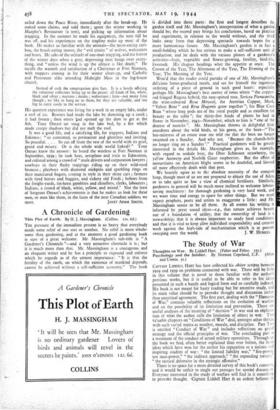The Study of War .
Thoughts on War. By Liddell Hart. (Faber and Faber. x5s.) Psychology and the Soldier. By Norman Copeland, C.F. (Allen and Unwin. 5s.) CAPTAIN LIDDELL HART has here collected his obiter scripta between 1919 and 1939 on problems connected with war. There will be little in this volume that is novel to those familiar with the author's previous works, but it is useful to be able to refer to' his ideas presented in such a handy and logical form and so carefully indexed. His book is not meant for hasty reading but for attentive study, and its main value should be to provoke thought and discussion rather than uncritical agreement. The first part, dealing with the " Elements of War," contains valuable reflections on the evolution of warfare and on the possibility of its limitation and prevention. There are useful analyses of the' meaning of " decision " in war and an explana- tion of what the author calls the limitation of object in war: TWO Venable chapters on" Conditions of War "deal, amongst othei things, with such varied topics as weather, morale, and discipline. Part Two is entitled " Conduct of War " and includes reflections on grand strategy and the official principles of war. The concluding part is a treatment of the conduct of actual military operations. Throughout the book we find, often better explained than ever before, the basic ideas which have won for the author his reputation as a serious and inspiring student of war : " the limited liability war," "fire-power, not man-power," " the indirect approach," " the expanding torrent," " the tactical defensive in the strategic offensive."
There is no space for a more detailed survey of this book's contents, and it would be unfair to single out passages for special discussion. Everyone interested in the study of warfare will find in it something to provoke thought. Captain Liddell Hart it an ardent believer in the value of the study of military history, which he rightly regards as an unduly neglected field. His own knowledge of the history of war is so wide and detailed that surprise is felt at the few mistakes which have crept into this volume. On p. 65 he rather forces the facts to make his point about the effect of weather ; the old heresy about the Armada appears again, and it was hardly rain alone that brought Leslie down from Doon Hill. The allusion to Biddulphsberg on p. 91 is-surely unfair. One feels too that the last word on Passchen- daele has yet to be written.
Captain Liddell Hart has much to say on the psychological side of war and he would agree with the Rev. Norman Copeland that " defeat is an attitude of mind." Mr. Copeland has written a brief study of morale and the way in which leadership can foster it. He brings to his subject not only a keen interest in psychology but a long acquaintance with the soldier and his ways. His conversation pieces are sometimes rather stilted, but the book contains a good deal of common sense and sound advice for the newly commissioned officer. Occasionally his opinions are too sweeping. " An army of inspired amateurs wore down an army of gallant but uninspired professionals " ; it is difficult to accept this verdict on the English Civil War. But as a practical guide to the art of leading troops the



























 Previous page
Previous page